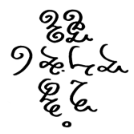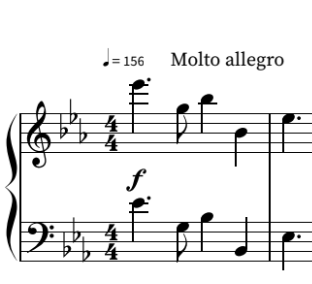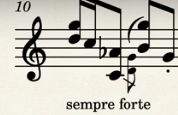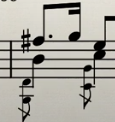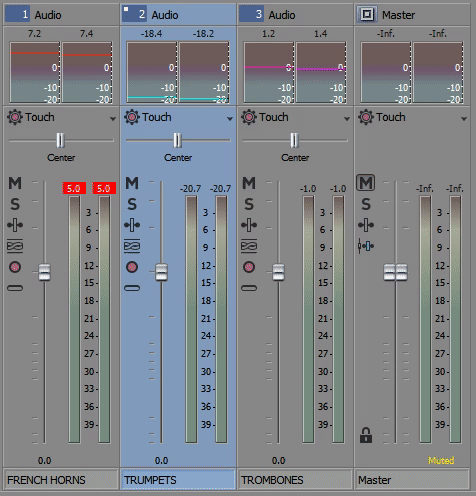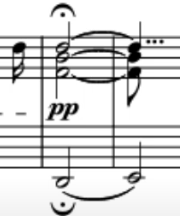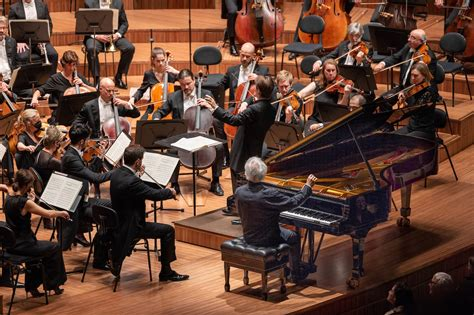Leaderboard
Popular Content
Showing content with the highest reputation since 04/09/2025 in Posts
-
The Image in G major is the third piece of the four piano pieces I wrote for relaxation after writing the very heavy String Sextet. I try to do something a bit different than the previous two pieces, as I actively use more quartal chords and pentatonics in the whole piece, and also invite a bit of impressionistic chords. This is my personal favourite of the set. Here is the score and YT video: (Final) Image in G major.pdf Like the previous pieces, this one also comes from recycled materials. It comes from an unfinished Piano Suite I composed in 2016 Jan, but only with fragments of it including the first few bars, b.35-38 LH melody and some parts of b.58-72. Don’t know why I went for pentatonics that long ago LoL! One thing to note: b.43-46 is probably inspired by @Fugax Contrapunctus Pabio’s mention of Joe Hisaishi in his review of my Sextet, plus my recent listening experience of his music while watching Miyazaki’s films. Hope you enjoy this small piece! Henry7 points
-
ello everybody, I've spent many months working on three short new piano pieces for beginning to intermediate students. These are originally intended for children to play, but could also be for beginning adults. In these pieces, I've also tried to discover my own voice and style, do let me know how I've done in those areas. Other feedback related to technique, harmony and playability would be much appreciated. Poem 1: "based on a theme by Beethoven", updated score Poem 2: "the quirky detective", updated score Poem 3: "the crazed capybara", score6 points
-
The final piece of my four Piano pieces set and just a lame joke. Can be developed into a postmodern minimalistic masterpiece by repeating the joke forever and forever...... Joke in A flat major.pdf Hope you enjoy this one! Henry5 points
-
4 points
-
I got a ping today that I am not active on here much anymore. Last August, I became bedbound with ME/CFS and have seen a steady drop in my abulities to do anything. From 50% functioning, to 40 to 30 to 20 to 10 to 5. Some days I can barely lift my head to eat. There is talk of putting me in a nursing home when my mom goes back to work this fall. I’m only 22! Oobleck, which I’ve posted here before, was written primarily in the first month of my illness. Before things became really bad. When I was still hopeful I would be better by “X” date. “It’s just the flu,” and “I’ll be ready to go back to school by fall break,” turned into a slow melting away of my entire life. Moving back home with my mom, leaving my friends, my college city, my life I had built, and having to start completely from scratch with a body that leaves me in 9/10 pain and dysfunction daily. It is a very potent work. Perhaps my first real “piece of art.” I am proud of creating something that is truly me. It is not about enjoyment, it is about the experience. I can dub the work as “Mahler, but with quarter tones.” I won’t be writing or doing much of anything for the next while. My life is too covered in oobleck. Program Note: The term oobleck is a type of substance that, when supported with pressure and force, is a solid. However, as soon as this support is removed, it oozes into a sticky liquid. Because of this, the oobleck always feels like it is on the verge of oozing apart into a mess of gunk. Dr. Seuss coined the term, introducing it in his story, "Bartholomew and the Oobleck." Its manifestation in the story is an evil, sticky substance which covers the kingdom it rains down upon. "Oobleck" is an aural exploration of a familiar musical world tainted by oobleck.4 points
-
This is the final draft of my best work up to date in my life, String Sextet in G flat major. Posts of seperate movements have been posted before and I'm not gonna repeat it here. If you're interested in the music details, pls check the following YCs: 1st Mov: 2nd mov: Here is the score and YT link of the work: String Sextet in G flat major.pdf Here is the structure of the work: (*denotes parts I love). The two movement structure is inspired by Mahler's 8th Symphony, so the second movement is proportionally much longer than 1st movement: 0:00 Opening credit and structure 0:11 1st Mov, 1st Part: Tao Primo (*3:35-3:47 nice bridge, **4:40-5:26 nice chromatics) 5:34 1st Mov, 2nd Part: Minore, a fugato, some little challenges (**9:40-10:10 nice retransition) 10:10 1st Mov, 3rd Part: Tao Return, a triple fugue and ending (falsely) (*11:45, **12:46 till the end) 14:48 2nd Mov, Lamentoso: Denial of Tao and realization of the realistic World full of tragedies. (*16:54, *19:11, ***19:44 sounds like my version of Bee's op.131 finale!, ***23:38-25:15 most emotional passage for me) 26:33 2nd Mov, Fugue a6: Objectification of emotions and reason. The most difficult passage for me to write technically but easiest emotionally. (**28:10-28:42 includes a 6 part stretto of 1st subject and a nice C minor modultation quoting my own Clarinet Quintet, ****30:07-31:27 a 6 part stretto of 2nd subject and one of my fav. section in the entire work with the very beautiful C minor passage, ***32:58-34:31 nice turn to pentatonics and nice disappointment) 35:03 2nd Mov, The Return. Start picking up the real self and soul and connect oneself with Tao, finding self equals to finding Tao. “I Six Books explain me and I explain Six Books (Lu Jiuyuan)”(*35:03-35:36 try to regain energy, **37:05,37:37,38:11,38:43 Nice color, **39:12 nice folk melody, ***39:15-40:15 Nice pizz.! And a very nice snap pizz! **** 40:46-41:46This passage leaves me in wonder. I don't know how do I compose this, **42:17-43:23 Nice appetizer fugato, ****43:24-44:53 Grand Climax!, ***44:54-45:41 Nice heterophonic passage which ignites my creative power for this movement, *****45:42 till end Pefect ending) This work was first inspired by Chinese Philosopher Tang Chun I's Realm of Heavenly Morality in his monumental book, The Existence of Life and the World of Spirituality, in April 2022. I wanna felt and descibed it hence I finished the whole 1st mov. I thought it's enough, until I met with my dedicatee Johnson, my respected philosophy professor Dr. Tao and my friend Merina in April 2023, and I knew it's not enough since without pain Tao isn't possible at all. After some painful incidents in 2024, I am finally able to finish the whole piece in March 2025. For me this work is about Tao, Tao lost and Tao regained. Since this would be the final post on the Sextet, please let me acknowledge people I would like to thank along my way of composing. This work is dedicated to and in memoriam Mr. Johnson Ho https://youtube.com/@beingintheworld?si=9Ch3hnk1UtluHTRF who sadly passed away in July 2024, and it's a regret the work couldn't be finished when he's alive. I would like to thank him for his great inspiration especially his postive way to deal with his illness. I would like to thank Dr. Tao, without his teaching esp. the one on the book Buddha-nature and Prajñā (?) did I realise the importance of pain and human suffering to morality and humanity, and probably won't have enough philosophical basis for this work. I would like to thank Mr. Vince Meyer @Thatguy v2.0, who acts as my musical Virgil, providing so many inspiration particularly in this piece's fugue and different motivic usage, and also make this great recording. Also, thank him for his encouragement when I kept saying I could never finish this piece. I would like to thank Dr. David Goza http://www.youtube.com/@David_Goza ,without his videos on YT I would never able to improve my own writing. I would like to thank Merina, Yvonne, Arjuna @expert21 and Peter @PeterthePapercomPoser for staying with me in my difficult times. I would like to thank Mike @chopin for his idea to go back to medieval texture in the Return. I would like to thank Luis @Luis Hernández which helps me solve the harmonic progression btw tritiones. I would also like to thank my ex-boss's mistreatment, as she teaches me a great lesson and the pain helps me reflect a lot which shows here. Also, thanks to everyone who has listen to this piece before and comments, as they help me a lot. Thank you Young Composers Forum and @chopin for giving me a chance to grow musically. Thank you for everyone who has commented on the work's parts before, I especially love the comments by @Fugax Contrapunctus @Giacomo925. Last but most importantly, I would like to thank my mum and family. Without their love I would probably fall much deeper and won't be able to finish this piece at all. Thank you!! P.S. One interesting fact on the piece is that it stays longer in F sharp minor then G flat Major….. Henry4 points
-
Looking at Peters original post, he wonders if focusing on composition work is narcissistic. I don't think so--at all. When I am working I need quiet and 100% of my bandwidth to do work. Thats how it is, and I suspect thats how it is with many. Writing music is hard. Being ultra focused is just part of this, as is any pursuit of such complexity. It certainly isn't clinical narcissism, and anyone labelling a person so dedicated to their craft/job/pusuit is ignoring what is involved. And nothing of great value can be created in this world without that kind of focus----art, music, engineering, architecture, scientific pursuits....3 points
-
EDIT: SORRY I MADE A TRANSCRIPTION ERROR LET ME FIX IT EDIT2: pdf file is fixed but the audio I need to fix it later as well EDIT3: audio revamped MM2HN soundmix.mp3 The original work by Henry Since Henry insisted I post this as my own work, here it is. Bear in mind I have only played the organ for less than once per week for a few months, please comment any improvements that could be made. I tried to give different stop voices in the system but the sounds don't go very balanced and apparently the vibratos are pre-recorded and can't be removed, but it kind of gives the right impression I suppose. If I ever get competent enough I might try recording it for real3 points
-
I finished the other two movements hooray!! Here's the YouTube upload. Please let me know what you think so I might apply the advice for future piano works 🙂 As for the piece itself, it's so personal to me I'm not willing to change anything, though I recognise it's not flawless. I think it is my very best piano piece and I'm extremely proud of it despite its issues. I'll do a rundown of the piece real quick so ya'll know what to expect. Movement 1. Sonata form, both themes are derived from the same rhythmic idea. A theme for desolation and a theme for consolation, which alternate in rotations becoming less and less certain until neither resolve. closes on a 6 4 chord. attaca into... Movement 2. Ternary form. A is a waltz with violent interruptions. B is more restless and dramatic. The return to A is based on first movement closing 6 4. Ending of A is infected with B motifs. Closes with a satisfying cadence at last. Movement 3. Ternary form. This movement is meant to be "looking back" at the events of the previous movements. B section is turbulent again. A section returns. The movement closes with a chorale "prayer." attaca into... Movement 4. Sonata form. Opens with a return to the consolation motifs from movement 1. First theme is dramatic and modulates constantly. Second theme is a combination of consolation and prayer. The climax of the development (and I think the climax of the whole piece really) with the minor version of the consolation theme from the first movement is in E minor which is a tritone away from tonic key. Recap has no proper second theme, only fragments. It ends resolved on a single note all by itself. All alone. Thank you for listening and for any feedback :33 points
-
I had another thought that I want to share. I have a mental health diagnosis, and my ability to write music quickly and into the sequencer/DAW went away at around the same time that I was diagnosed. Back when I used to write that way, I remember that my process of writing music was very sporadic and consisted of basically trying to throw $hit at a wall to see what would stick. There was no deliberation and contemplation between my musical decisions and I produced a lot of material that I never developed into finished pieces of music. I remember that, at that time, I was very bipolar about my creation process and I believed the romantic myth about creators getting a "stroke of inspiration" or being "inspired by their muse" or something. So most of the time I ended up feeling uninspired and didn't like the ideas that I'd come up with and hence never continued them to see where they would lead. When I did get good ideas I would spend long periods of time at the computer to get as much out of a good streak of luck at composing as I could and often stayed up all night. In that sense it was like gambling at a casino or something. While being hospitalized at the mental hospital, I had to learn to write music on paper and inadvertently discovered a different, more measured way to compose music. The benefits of composing on paper were not all apparent to me all at once. But besides forcing me to imagine a composition without hearing it and the many advantages of doing so that I've already espoused above, the other big advantage of writing on paper was that it forced me to slow down the process to where my brain could cope with the creative process and the craft and actually contemplate my own ideas at a manageable pace. I think, in comparison to how I used to compose, I was composing in a much calmer, and controlled way. I never realized how emotionally exhausting and anxiety inducing my previous way of composing was until I got my mental illness, and it's possible that I got my mental illness in part because I was "the creative type" and that I forced myself through drastic emotional upheavals in order to create. The truth is, I can no longer cope with trying to write music the old way. But I do believe that writing music on paper is the right way for me to compose for who I've become and who I am today. And that must naturally include all my strengths and weaknesses as a human being and composer. Once again, thanks for reading.3 points
-
Hi @user011235! I was about to go back to your Overture in G and move it to the Incomplete Works forum but decided against it because it doesn't seem like an incomplete work. It's just a juvenile piano work. This piece too I feel like actually sounds complete and should go in the vocal music forum - I can move it there if you want! This piece is quite wonderful btw. Once again, I feel like most of your annotations are trivialities. I think whether you put accents in the beginning is a matter of how you want your rendition to sound and how your program handles them. A person performing this on piano would know to bring out those notes slightly because they introduce a new chromatic note. Even just the fact that it's a chromatic note naturally brings it out and it's on a strong beat so yeah. At this tempo, the 16th notes in measures 11 and 31 are fine I think and real performers would probably take those phrases at a slight rubato tempo or slightly slower at least. I think the beam of the top voice in the left hand in measure 18 could be split between beats 3 and 4 to make it look nicer but other than that it's not really problematic either. At measure 19, I'm not sure what you mean by double stops. Double stops are chords that are usually played on two different strings on string instruments. That term is not usually used in piano music since you're not stopping the strings to produce the sound with a different length of string. Do you mean chords harmonized in 6th and 5ths? I didn't really notice that that passage lacked harmonic definition so unless you plan on beefing up the harmony throughout the rest of the piece to continue its consistency then I'd advise against it. In measure 26 I vote for it to be a grace note, but you're the composer - if you made it like two 16th notes, to me the 16th note motion might imply that the rest of the piece (at least the left hand) should be in 16th notes as well as a kind of variation of the beginning. I think measure 34 is a wonderful chromatic moment! Not too dramatic at all - or rather it's a very much welcome drama. Measures 44 - 46 I think your idea of using the phrasing marks as you have annotated isn't confusing at all and would quite natural for the pianist to interpret. What you could also add is phrasing marks for the voice which I think is way more important as it would let the singer know when you expect them to breathe and how long you expect them to sing without interruption. Thanks for sharing this wonderful pastoral song!3 points
-
Unable to sleep once again, this early morning I have managed to compose a Late Romantic-style overture for string orchestra. This piece's overall character stems from the metaphor of a harsh storm passing, as hinted by the German title shown in the score: Der abflauende Sturm. Albeit short, compared to my usual standards it is both quite emotional and reflective simultaneously as I tried to pour my feelings on the current state of affairs in my life into music, and I must say, in terms of either harmonic variety and dynamic expression, I think it turned out better than I could have ever imagined, especially considering the fact this work and its idiosyncrasies are pretty far removed from my usual compositional style. Enjoy! YouTube video link:2 points
-
A little piano sonata originally composed in 2018. I tried touching it up a bit... I'm still not happy with it (for example I left out any dynamics except in the beginning and ending measures), and i'm publishing it still in its rough form. Here's why: I think this piece illustrates one of the main problems I face when composing, which I've mentioned before but basically is: too many ideas for multiple ways i could do things, + lack of knowledge that would guide me to choose one of those options over another. I often feel like I have no guiding forces governing the choices I make when composing, and so I end up with pieces that don't have that cohesive deliberateness indicative of someone who really knows what they're doing. Any feedback is welcome, on this piece specifically or on how I could solve this greater issue with my composing. That being said, please enjoy 😅 I'm still quite fond of this sonata, it's got a decidedly galant sound but with my own idiosyncrasies thrown in.2 points
-
Hi everyone, I composed this piece as part of my bachelor in music. I hope you enjoy it. Leave a like or a feedback if you want! 😊2 points
-
I've really struggled to get my head around music theory - the way it's currently presented - since I started composing last summer. So, I've been giving some thought as to alternative ways of presenting it that might make it more accessible to new untrained composers, especially those who use DAWs and samples rather than manuscript. This video is meant as an exploration only - not suggesting better or worse approaches, or taking a position - only considering alternatives that could work for some people. Hope it's helpful. https://youtu.be/O_SSqvaVKDA?si=QXuksfXovuawS3Tf2 points
-
For me, I like taking breaks where I don't review for a while because I feel the same way most of the time (only @Henry Ng Tsz Kiu is a reviewing super-musician who reviewed 10's of works at a time without a rest! LoL!!) But after a while I do eventually find the energy as I feel like it accrues after long periods of not reviewing. Besides, you can review as deeply or as casually as you feel like at any given time so it's not always an incredible amount of effort necessary. Thanks for your response! I added that option to the poll (although I do have to say that comparing yourself to others this way is not very conducive to improving because regardless of how good you are, there's always likely to be a historical composer, or specific piece which you can consider "leagues ahead of" you and feel discouraged by. Nobody can be leagues ahead of you being you though. And your strengths and weaknesses are unique to you and that's what makes you a unique, individual human being and composer. Did you know that Beethoven considered himself bad at counterpoint in comparison to Bach and Mozart?2 points
-
Haha you don't have to always provide critiques, sometimes you may just name out spots you like or dislike would be great to the composer! Unless you provide "reviews" like "X-C-Lent" without using any thinking, leaving comments will always be great! Henry2 points
-
I'm late to this topic but i wanted to chime in anyway because the reason i'm late is the same reason i don't review more works. For me it's lack of energy, i feel like that part of my brain that would analyze and give feedback, or even engage with topics like this, is just too tired and i end up not doing it. I selected a few of the options but that's the main thing. Oh also, an equally big reason is that many (most) of the composers on here are leagues ahead of me so how am i gonna tell them how to improve, y'know?2 points
-
2 points
-
It's actually quite funny how this person couldn't be bothered to read between the lines and as such your comments' whole point flew right over their head. Really amusing how they have essentially exposed themselves by trying to expose me, like calling them out in private for these immature tactics they're displaying at any point warranted any kind of convincing response. Moreover, playing the victim card by accusing me of "toxic masculinity" or whatever for defending myself and pointing out what they're doing is pretty low, specially coming from someone repeatedly showing this kind of behaviour. Anyway, not much else to be said about this person, by their actions it should be fairly evident by now that they are clearly ill-intentioned and ostensibly incapable of taking criticism or self-reflection. Thank you for your help nontheless, Henry, as I would have otherwise lost my temper and wasted my time and energy all by my own on someone who plainly does not deserve either of those.2 points
-
I have actually seen that post you have made and I actually thought it was really interesting since it came out from you.2 points
-
There's indeed no need, Pabio was trying to save your face but you just openly disclosed the inbox message yourself by posting. That's really X-C-LENT!2 points
-
Wow I did not expect this to be completed in such a short amount of time after I had posted the work in progress thread a week ago. That's a record. Though, I guess I did work on in beforehand. Still though, glad this one is not stuck in work-in-progress purgatory, just like the others... Anyways, since the latest progress, I've modified the return to the first theme, most notably, a flurry of ascending scale on b.105 followed by a trilled downward passage of the theme. This is done to kick start the momentum of the piano's spotlight on the proceeding bar instead of just the piano reciting the theme alone in the 2022 version. Another drastic change is that I've turned the passage from b.112 onwards to be a build-up for a proper, actual climax at b.118. Additionally, I've fixed the many of the pitch spelling errors and, of course, tidied up the score as well. There are other smaller changes on the piece as whole, but I'm not gonna list them here. I'm really really happy I did this revision 'cus, again, I just love the themes in this and it's worth putting it to my current musical knowledge. It feels satisfying and gratifying. Old version for comparison: Progress Thread (wow i posted only two progresses on there) Hope you all enjoyed this and lemme know what you think! Thank youuuu edit: thanks to @pateceramics for pointing out the ineffective rhythmical change on bar 5-7.2 points
-
I did play around with your suggestion, changing the triplets to the 16th notes, and yeah, it is so much more smoother now. However, I wanted variation on the second repetition, so I substituted the rhythmical change for harmonic and dynamic. I changed a bit of the notes from the ostinato, and the passage now crescendos a bit to forte then diminuendos to the unchanged pianissimo, just to add contrast. I've also properly modified the repetition at the end of the piece to match the change. Thanks for the suggestion and feedback! Glad you like the piece!2 points
-
This work is impressive and considerable. I think that for its length it has no comments. Nowadays it is difficult to hook people with extensive works. Greetings.2 points
-
Hello Young Composers, Today I present a Romance I've been working on for awhile. This is one more of my more edited pieces, I've spent some of the most time on this piece than almost any of my orchestral movements. This piece was written initially with the goal of imitating a Rachmaninoff style Romance. Before you get excited, I can fully say that is not how this piece ended up, but I would still be willing to say this is probably my best piece yet. It's definitely my favorite. I was hoping to save posting this piece until I finished the suite it will be apart of, but I simply have not had the time, motivation, or research to write what I would like. This piece airs on the dramatic side of things. As always criticism is welcome, even if you cannot find the words to make it constructive. I'm especially curious about playability, balance, and formal fluidity.2 points
-
Hi, guy, I suspect the problem is that an octave above middle C really is quite high for most tenors. Counter tenors can sing that, or higher, but they are an exceedingly rare voice type. The samples you bought may be giving you a more realistic idea of what you would get from a group of vocalists than your composition software. It's not that men who can sing that high don't exist. That is technically a range some tenors can sing in, but only a tiny number. Take a look at some standard choral repertoire and you can start to get an idea of the more commonly used parts of the range for different voice types. And remember that it is only in modern times that we have started using the "modern" tuning. Historic pieces look like they are written higher than they actually were, because the composers and singers were using a different tuning standard when they were written, and they are still performed down at that historically accurate tuning today.2 points
-
Hi again @Dima Kravets! I agree with what @luderart has said above about the difficulty of some of the double and triple stops. Including consecutive double stops that can be really difficult as well! Such as these: and these: In the first image the D and G have to be played on the G and D strings respectively and right after using those two strings for the C and Ab. In the 2nd image the G and D open bottom strings are played before moving to a parallel fifth on the A and E strings playing a B and F# which have to be barred at the same location on the finger board which can be difficult. I also agree that a real performer could definitely breathe more life into the composition with their interpretation. But it's a thousand times easier to make a musical interpretation if it is clear to the performer that the composer already has an idea of how the piece can be expressed in a musical way. This is especially important for pieces that are for a solo instrument because the soloist is tasked with keeping the momentum and musicality of the work all on their own which is much more intensive than collaborating with another performer. The soloist is asked to "make something out of the work" that in many cases has never been performed before. So having a good idea of what you want as the composer can really help the performer out and facilitate a future performance. And making a good rendition with lots of tempo changes and musical indications as to how the piece should sound even in electronic form is important as well (perhaps as a selling point to get a performer convinced to perform it). I see from your profile that you specialize in chamber music so you probably already have a good idea about that. But when you say things like: it makes me think that you don't see the point or value of making a realistic rendition, which is a shame. Needless to say, the piece sounds very mechanical throughout and could stand from some humanization and TLC to improve it. But it's better to already be thinking of those things as you're composing it rather than having to go back and revise a piece that wasn't conceived musically to begin with. That's just my own perception of the piece however. I look forward to hearing more of your contributions to the forum (as well as potentially your opinion about other composers' works on the website!) Thanks for sharing. P.S. I'm sure the reviewers of your work (including myself) would appreciate a ❤️ or a 🏆 reaction/acknowledgment of their time and effort that they took to listen and formulate a response. It would really help our little musical community flourish! Thanks in advance!2 points
-
Hi @FILMSCORE! Nice orchestration! To me it has the hallmarks of a charcuterie of different orchestral textures from the classical orchestral literature. The beginning starts as if you're going to give us a trial run of all of your orchestral samples for us to test out how your orchestral libraries sound. There's a clear allusion to Holst's Jupiter from the Planets Suite (around the 1:00 mark although the melodic content in the brass is a bit different). I'm not sure what the fanfare near the beginning is from. The harp is often too loud in comparison to the rest of the instruments and is not doing its signature glissando flourishes that could give your orchestration so much more color. Although it might be really taxing on your software/equipment to render quick harp glissandi with so much reverb. It might be easier to render the harp and the rest of the instruments with less reverb especially if they're all playing together. Thanks for sharing!2 points
-
Its not enough to just HEAR the music, youve also got to SEE the music, and im not talking Notation-Score. Regarding the FINAL-MIX-DOWN , iv often thought to myself........... " Yeah that sound ok ".........Without even checking to see the levels-Balance. in the example below: 1: The French Horns were 5-db OVER 100% 2: The Trumpets were 27-db LOWER 100% 3: The Trombones were 6-db LOWER 100% The Final Result sounded imbalanced2 points
-
This is a setting of Robert Frost's beautiful poem that I wrote around Easter 2018. Included is an annotated copy with things i'm unsure about. Any feedback is appreciated2 points
-
Hi @ComposaBoi! I know I've heard the 1st movement before but am not sure if I reviewed it. I don't hear the following chord in your performance: I just hear a Db both in the left and right hands. Also, didn't you mean to mark this as 8vb? 8vb means an octave lower while 8va means an octave higher: That aside, I find the main theme to be so happy-go-lucky in comparison to the bleak introduction! LoL I think the way you present the main theme in measure 78 is more appropriate to be the main theme proper, being darker and more suited to follow the bleak introduction. I know you said you won't be changing it but I'm going to give you my impressions nonetheless. The version of the main theme at 151 is also nice - not overly happy-go-lucky but rather, bittersweet. The version of the main theme at 220 where it is used as a modulating sequence is really good! I much prefer this treatment of the happy-go-lucky material as it sounds more developmental and suited for modulation. When you return to the material of the bleak introduction the 2nd time it sounds really empty and like the momentum of the piece just stops and falls dead (especially with the left hand staccato notes). The 2nd movement waltz sounds like it really flourishes perfectly out of the 1st movement! It really creates a lucid listening experience. The only thing that brings me out of it is the allegro furioso. I think it sounds way too fast and intense for the bittersweet mood you set with the beginning of the waltz. I like how you reference back to your 1st movement material with the molto meno mosso part. With how fast and furious this part gets it's amazing that you managed to perform it! I think bringing back the dreamy main waltz theme towards the end really releases some of the furious tension you build up with the fast tempo sections. Great job with these two movements! I'm looking forward to reviewing the last two at another time. Thanks for sharing!2 points
-
If you were going for a movie score feel then you got it, because it sounds like the soundtrack for a Marvel movie (not meant as a slight). I do agree with what Peter is saying about the accompaniment overpowering the melodic lines. This is something I have struggled with as well, in sometimes layering too much, and ending up with a muddy mess. It sounds good, but it hinders the ability to focus. I would suggest going through, the softer moments especially, and seeing where you can edit out some of the underscoring, to let the melody shine through a little better.2 points
-
Hi everyone, I would like to share with you my first major composition: a string quartet. My compositional style is evident in it, which is quite unusual, but at the same time I think it is accessible to a wider audience. I'd appreciate it if you gave it a listen! Thank you! https://youtu.be/WPfU9OKB8Aw?si=EFZEiZDdlTbWXOnu2 points
-
Here is my 3rd and latest composition. It is a tone poem based on a poem by the first european female author, Sapho. I hope you like it and I would like some feedback. Here is the poem "Hymn to Aphrodite" in English. Iridescent-throned Aphrodite, deathless Child of Zeus, wile-weaver, I now implore you, Don’t–I beg you, Lady–with pains and torments Crush down my spirit, But before if ever you’ve heard my pleadings Then return, as once when you left your father’s Golden house; you yoked to your shining car your Wing-whirring sparrows; Skimming down the paths of the sky’s bright ether On they brought you over the earth’s black bosom, Swiftly–then you stood with a sudden brilliance, Goddess,before me;Deathless face alight with your smile, you asked me What I suffered, who was my cause of anguish, What would ease the pain of my frantic mind, and Why had I called you To my side: “And whom should Persuasion summon Here, to soothe the sting of your passion this time? Who is now abusing you, Sappho? Who is Treating you cruelly? Now she runs away, but she’ll soon pursue you; Gifts she now rejects–soon enough she’ll give them; Now she doesn’t love you, but soon her heart will Burn, though unwilling. “Come to me once more, and abate my torment; Take the bitter care from my mind, and give me All I long for; Lady, in all my battles Fight as my comrade.2 points
-
Hi again @UncleRed99! My perception hasn't changed by much, but I think I can better explain why I perceive the piece the way I perceive it. I can hear that you definitely intend there to be a main melody leading the piece from beginning to end but there are a few factors that (in my opinion) prevent this from being a lucid listening experience for the listener. Sometimes the melody is just overpowered by chords in the orchestra played loudly while a single solo instrument is playing the melody and it doesn't really get heard. The most obvious example being the bass clarinet melody in bar 5. There are also other examples where you kind of create a polyphonic/heterophonic texture where it becomes kinda hard to hear which instrument is supposed to be the focus or main melodic line. There are ways to make polyphonic/heterophonic textures work though but that would necessitate them being more self-similar and use a higher economy of means to achieve a more obvious audible relation to each other. While if that isn't achieved, then it can end up sounding like you're just noodling around in a certain key. Although I don't want to neglect to give you credit where credit is due. You definitely have a recognizable motif that permeates this piece: It's just that this is a very short recognizable motif that is just repeated throughout the piece without really being used to develop it by using it as the dynamo and origin of all of your other melodic material. When the other material isn't connected together it can sound dissolute and lacking in direction or focus. That's my perception of the piece. I'm glad you're so determined to continue to improve and I hope some of what I said can help you further on your journey!2 points
-
I hope you will consider taking another look at this, whenever you’re able to find the time for it 🙂 I’ve made many improvements to it since. I know that my form / structure is a bit abstract/abnormal. I met a friend on Musescore back when I wrote “The Long arctic midnight suite” in 11/8 time, and he also edited my score “Lamentation” on his own volition. we sat in a discord call for like 5 hours yesterday, analyzing one another’s scores. He’s a composer and is on his way to getting his masters in composition, and he performs as a classical pianist. He gave me some material on Binary and Ternary Form structure, and stated that I’d probably be most interested in Sonata structure.. (all of which I was clueless about until now 😅) He says he thinks this is one of the better compositions I’ve written, based on the modulation, and the chord progressions I’ve used, as well as the complexity in voicings within the chords and the melodic lines. Although, the form could’ve been executed in a way that would’ve been easier to digest. He called this “through composed” mostly, with some returns to a main motif. with this context, I believe what I’ve done, here, could be better understood, in addition to the changes I’ve made. I value your feedback as well as @Henry Ng Tsz Kiu’s feedback in this forum, given how methodical and detail oriented you both tend to be. I’m just looking to improve upon what I already know, learn what I do not know, understand what I have accomplished effectively, and have things to reflect on in regard to what was ineffective or poorly executed. i know I’m just an autodidact who does this as a hobby, but I’m a bit of a perfectionist who’d love to be that outlier independent composer who can write scores that are educated, well executed, and well received by the internal industry audience. 🙂 thank you in advance, Peter !2 points
-
So this is something i have worked on for four years now. I was inspired to write it, as ballets (Rite of Spring, Petrushka, Firebird, Romeo and Juliet, Swan Lake) are some of my favorite pieces of music. I wanted to see if I could carry a narrative through the music. It's long, it's a full 2 hour ballet. I fully understand most people will not listen to it, but if you have sometime. I wanted to have the score ready with it, but I had an unfortunate incident with a failed hard drive, that claimed three of the scenes. I hadn't realized they were not backed up, so I'm in the process of reconstructing them from the audio. I've included a program for you to follow along with. Roles: Tove - Youngest child of a peasant family Bjørn - A prince, cursed to be a bear during the day Åge - Father of a peasant family Liv - Mother of a peasant family Revna - A witch who cursed Bjørn Estrid - A young maiden and one of three sisters Frida - A mother and one of three sisters Gudrun - An old crone and one of three sisters East Wind, West Wind, South Wind, North Wind Tove’s brothers and sisters Revna’s servants ACT 1 Scene 1: During a great famine, a peasant (Åge) is searching through the woods, looking for food. Suddenly, a monstrous white bear (Bjørn) appears before him. The bear offers to give him all the wealth and food he could ever need, in return for his only daughter. Although troubled at the thought of what the bear will do to her, he accepts, knowing that his wife and other children will starve if not. Scene 2: Upon returning home, the peasant tells his family of the bear's offer of wealth and food. His wife (Liv) and sons are shocked that he has traded away his only daughter. His daughter (Tove) is horrified that her father has given her away to this magical bear but accepts her fate, knowing that it will save her family from starvation. Bjørn comes to collect his payment and bestow upon the family what he has promised. Before their eyes, their shack is transformed into a mansion, filled with gold and endless food. Tove reluctantly follows Bjørn into the forest. Scene 3: Bjørn and Tove travel through the woods, with few words spoken. A pack of wolves attacks, but Bjørn drives them off. As they reach the edge of the woods, Tove suddenly sees a magnificent castle. Bjørn informs her that this will be her new home. He tells her that the only rule she must follow is to never light a candle during the night. Scene 4: As night falls, Tove prepares for bed and puts out all the candles in her room. She climbs into bed in the darkened room and begins to drift to sleep. She is startled by someone entering the room. She calls out, but no one responds. She goes to light a candle but then hears the voice of Bjørn, reminding her that she must never light a candle during the night. After a while, she drifts to sleep. ACT 2 Scene 5: Almost a year has passed, and Tove has discovered that Bjørn isn’t the monster she first thought him to be. She finds herself beginning to feel a deep affection for him, just as she notices that he also is falling in love with her. Scene 6: One day, Tove asks Bjørn if she may visit her family, as she is missing them. He grants her wish but makes her promise that she will not speak to anyone about her life at the castle. Tove returns to her family, and they throw a celebration in honor of her visit. During the celebration, her mother continually tries to ask her about what goes on at the castle, but she manages to avoid the questions. After the party has finished, Liv corners her and demands answers to all of her questions. Tove reluctantly tells her mother about the mysterious man who enters her room each night. Her mother tells her that after the man has fallen asleep, she should light a candle so she can see who it is. Tove tells her mother that she is forbidden to do that, but her mother insists that no one will ever know. Scene 7: Back at the castle, the pattern of events continues as before. During the night, the mystery man enters her room and falls asleep in the chair. After a few nights, she decides to do as her mother has said. She waits a long time after he has fallen asleep and then lights a candle. She leans over his body to see the face of a beautiful young prince. She is so captivated by his face that she doesn’t realize that melted wax starts to drip from the candle. It lands on the sleeping man, the heat waking him from his slumber. He sees her looking at him with the candle and jumps from the bed. He explains that he is Bjørn, and a witch (Revna) had transformed him into a bear because he refused to marry her. Under the curse, he must spend each day as a bear, only becoming a human at night. The only way to break the curse was for a woman to fall in love with him without ever looking at his true face. Only by earning her trust could the curse be broken. After apologizing for having failed her and himself, he must now marry Revna and be imprisoned in the house that is east of the sun and west of the moon for the rest of his life. The room suddenly goes dark, and as light reappears, Tove finds herself in the forest, alone. ACT 3 Scene 8: Tove is wandering the woods, grieving over losing Bjørn. During the many months with him, she had come to care for him and realizes what she has now lost. While walking through the woods, she comes upon a young girl (Estrid), whose leg is trapped under a fallen tree limb. She helps free her, and the two begin to talk. Tove asks her if she knows the way to the House east of the sun and west of the moon. Unfortunately, Estrid has no idea, but she magically conjures a horse that will carry Tove to her sister (Frida), who may know the way. She also gives Tove a golden apple as thanks for having freed her from the tree limb. Scene 9: The magical horse carries Tove to a lake, where she hears cries for assistance. She sees a mother, holding her baby, trapped upon a rock in the lake. The woman tells her she is unable to swim and fears her child will drown. Tove crosses the river to the rock and helps the mother and child safely back to the shore. She discovers that this woman is none other than Estrid’s sister Frida. Tove asks if she knows the way to the House east of the sun and west of the moon, but just like her sister, Frida has no idea. However, she conjures a magical boat that will carry Tove to the other side of the lake and to the house of her other sister (Gudrun). She tells Tove that if anyone knows, it will be Gudrun, as she is the eldest and wisest of the three. She gives Tove a golden comb as thanks for saving her and the child. Scene 10: The magical boat carries Tove far across the lake. In the distance, she sees a small hut that is in flames. As the boat comes to the shore, she hears the screams of an old woman from inside the burning house. She runs inside and drags the old woman out just as the hut is completely consumed by fire. She discovers that this old crone is none other than Gudrun, the third sister. Tove pleads with her to tell her the way to the House east of the sun and west of the moon. Gudrun tells her she must travel to the place where the winds of the east, west, north, and south meet together and ask for their assistance; only they can help her find the way. She then conjures a great bird to carry Tove to the highest mountain peak and gives her a golden needle and thread in gratitude for saving her from the fire. Scene 11: As Tove approaches the summit of the highest mountain, she sees four old giants arguing with one another. The bird lands, and she approaches them, asking if they know where the four winds could be found. One of the giants tells her that she is in their presence already, as the other three try to interject. She realizes that it is their constant arguing and screaming which produces the winds. She asks them if they can help her reach the House east of the sun and west of the moon. The East, West, and South winds tell her they know not the way to find it. The North wind proudly tells her that he once carried a sparrow to this far-off land. She asks if he can take her there as well, and with a gentle breath, he launches her into the sky. ACT 4 Scene 12: Tove awakes in a field, thinking she has dreamed everything that has happened, but then sees a massive house, with the sun to its left and the moon to its right. As she approaches the house, she sees a woman (Revna) collecting mushrooms. She asks if there is a young prince at this house. Revna asks why she wants to know. Tove offers her a golden apple if she may spend the night with him. Revna agrees to this deal but then gives Bjørn a sleeping potion so that he won’t see this beautiful girl. Scene 13: Tove tries again the next night, after offering the golden comb as payment, but again Bjørn is drugged. As Tove cries over his body, telling him how she loves him and regrets not trusting him, the servants overhear Tove’s cries each night. Scene 14: They decide to tell Tove about the sleeping potion. After receiving a payment of a golden needle and thread, Revna once again conspires to drug Bjørn into sleep. However, Tove has arranged for the servants to switch the drink. Bjørn goes to sleep, while Revna believes she has drugged him. Scene 15: As Tove enters the room, she once again declares her love for Bjørn and tells him to wake from his slumber. Bjørn opens his eyes and, upon seeing Tove, tells her that they will be together forever. Just as they go to kiss, Revna rushes in to stop them, but they kiss, and Revna bursts into flames as the curse is broken. They free all of the servants and together leave the house east of the sun, west of the moon, never to return.2 points
-
2 points
-
anyways, this is a tone poem that is performed like any other concert piece. The piece itself is pretty long and every act spans from 18 to 30 minutes each. It should be performed like an opera or a ballet, despite there being no acting or dancing involved. instrumentation notes There are three oboes in total. All three double on bass oboe in the first movement. • The first clarinet part has two players: • One playing the upper line. • One playing the lower line, doubling on piccolo clarinet in the first movement. • Throughout the piece, both oboes and clarinets will need to switch back to their primary instruments at various points. This is act one out of four and I am still revising them so I could put them on here anyways here are the performance notes: The act opens with Prelude to the Heart, hinting at the emotional turmoil ahead. Ross’s theme, The Solitude of Ross, explores his quiet longing, while The Jesters (Tobias and Percival) add lighthearted moments of friendship. The arrival of Aldric, The Manipulator, disrupts Ross’s world, introducing him as the antagonist who plays mind games with Ross. Meanwhile, The Council of Shadows represents the complicated dynamics of Ross’s social group. Orson, The Disruptor, causes further tension, while The Mocking Wind symbolizes the cruelty Ross faces. However, it’s Selene, The Light in the Mist, who captures his heart, leading to a deep emotional connection in The First Glance.Ross’s feelings intensify in Eclipsed by Desire as he falls deeper in love. In the midst of his growing affection, The Gathering brings subtle tensions to the surface, and The Quiet Northern Winds reflect Ross’s inner turmoil.The turning point comes with The Shadows of Mockery, as Malcom and his followers begin to torment Ross, leading to The Great Deception—a moment of cruel betrayal. Ross retreats into Reflections in Silence, contemplating his situation, while at the Spring ball intensifies the emotional conflict. The act closes with Florence’s introduction as The Siren’s Call, adding another layer of complication to Ross’s feelings for Selene.2 points
-
2 points
-
Hey @Fruit hunter! Very interesting music! I think when writing a programmatic work like this, it is important to be able to involve the audience more in the story that you want to convey with the music. In other words, you want to give the audience an idea of what it is that they should be listening for. I can see in your score that you are working with thematic leitmotifs. As a casual first-time listener to this work I find those themes hard to pick out and hear. Perhaps, you could give the listener an introduction to each melody in isolation and associate it clearly in the audience's mind with the character you want it to represent? Maybe you already do that and I'm just missing it or not getting it? One thing that certainly seems to be the strength of the composition is the orchestration though! Thanks for sharing!2 points
-
Hi @BipolarComposer! I like the mood you set here! It's like a mix of music from the classic videogame "Metroid" and a bit of Elliot Goldenthal. The latter half is quite different from the beginning which sets a menacing but mysterious mood. But the end is like a release. I like it a lot! Thanks for sharing. I hope you don't end up removing it sometime in the future - it deserves to be heard by the community! Also, to encourage more participation and interaction between you and the people who might listen and review your work you could give a ❤️ or a 🏆 as a reaction to our reviews! And btw - Happy Easter!2 points
-
2 points
-
2 points
-
Hello Great music! The impressionistic mood is very well noted. Some things lead to Debussy like setting a Tonic with pedal on low notes or the “la cathédrale engloutie” style chords. But also those continuous arpeggios remind me of some of Henry Cowell's techniques (although he did it inside the piano). It's a harp-like effect. The fourth harmonies here sometimes lead to unexpected harmonic cadences and I quite like that.2 points
-
Nah not at all. Just make sure to credit the composer if you use someone's music for your own purposes. I noticed that your alterations maxed out the volume no matter what the dynamic levels were supposed to be. Maybe try just making the loud parts louder, but have the wisdom to give subtlety where it's needed.2 points
-
WOOOOOOOOOOOOOOOOOOOOOOOOOOOOOOOOOOOOOOOOOOOOOOOOOOOOOOOOOOOOOOWWWWWWWWWWWWWWW What a piece. I've listened to it many times now. Movement 1 Part 1: I love all the pentatonic themes, they're extremely beautiful, especially the one at m. 35 derived from your clarinet quintet, I just wish the audio was a little clearer and brought them out over the texture better. The texture itself is great too. However, the idea that appears first at m. 19 I think is too textural for my taste, almost as if there should be something more melodious overtop of it. The sequencing at m. 111-114, I would include tenuto marks along with the slur which is the more standard way to notate it, and it's clearer to performers what to do. For example, we know with Beethoven's Grosse Fuga, some performers play the slurred quarter notes as half notes, and others play them as quarter notes in one bowing. you do similar things throughout the piece. Some more positive thoughts I had, at rehearsal mark F, it sounds like a call to action! And all the modulating and texture at the end of this first part makes me think of a violent river 🌊 Movement 1 Part 2: I think my favorite part of the movement. Provides a good contrast, but still sounds oriental, so it doesn't feel out of place to the soundscape you've thus far presented. The contrapuntally dense section immediately following the fugato is so powerful!! 🤯 The next part is almost too sparse after that, and not a whole lot really happens for me. My first listen I remember being tempted to skip ahead because I was kind of getting bored 😕 I'm glad for the lighter, simpler mood, and I think it's well earned, just maybe a little too sparse for my taste. The transition back to the beginning atmosphere is epic though 😎 Movement 1 Part 3: Similar thoughts to part 1. Great melodies that are hidden by the texture, not by your fault, but just the audio. The ending is satisfying enough to close the movement but still leaves enough for me to want to listen more. ~~~ Movement 2 Part 1: The sheer pain I hear in the first sections of this part. I think it's too raw for it to warrant or need any criticism. I once again wish the audio could bring out the melody clearer, but it's better here than in the last movement I suppose. I will say about notation this is not how you should notate this. 8th notes already have one tail, so it only needs 2 tremolo lines. Likewise, a 16th would only need 1 tremolo line, etc. The section starting at m. 92 makes me emotional. Well done. The following section is a good break, and was perfectly timed. Had the first section gone on any longer, I would have felt maybe that it was too long, but here it's the perfect length. m.179-182 is oddly very beautiful to me. Almost a taste of what the idea from m.92 would be in a better light. And immediately following, back to tragedy, AGH 😫 Movement 2 Part 2: THE 6 VOICE FUGUE 😮 I don't feel qualified to properly go over your counterpoint and I understand it's not supposed to be the strictest fugue. It sounds correct to me, and it certainly does a good job at expressing what it's meant to, which is the MOST important thing of course. Now, you're going to hate me for this, but I think the cellos being so close so often is really really muddy and creates extremely unpleasant overtones. It might be better with real cellos, probably not though, I wouldn't ride on it. Again, the counterpoint is really great to me, the modulations are smooth and so dramatic, and I love it. I don't want to hate on it, it's just really muddy 🙈 you fix the muddiness later in the fugue which is nice. Movement 2 Part 3: Final part!! The start really makes you feel like it's preparing for something. It makes me excited for the end every time!! As someone trained in singing gregorian chant, I think the chant section is VERY effective, and I love the beautiful passionate chords between 🥹 The turning point and the build to the original Tao material is wonderful too and definitely well-earned after all that! The themes are beautiful like before, and they feel freer almost. It's like a fireworks celebration!! A very good and satisfying and Chinesy ending xP Overall, I think it's definitely a masterpiece and deserves all the praise it's getting and more, (except maybe the deification of you from Fugax Contrapunctus xD). However, I'm sorry but I think I'm partial to your clarinet quintet because I still enjoy that more, or maybe I just like sad music 😛 Anyways thanks for sharing your wonderful music.2 points
-
It sounds fantastic! I really like the organ and its ability to color with the cantidd of timbres available, when used well. As it happens here. I think the original composition is well suited to the instrument, or the other way around, by virtue, of course of a good arrangement. Just an observation about the “agitato” passage from measure 34. I think the chords in the middle part sound too “abrupt”. I don't know, maybe it's the intention, but what strikes me most is the transition to the next part in measures 41-42, which does sound sudden. Thanks for sharing. Regards.2 points
-
I personally can't imagine writing by hand (after all, this is why I am investing time into a new music notation software 😄), however I understand your reasoning. Writing by hand is much more deliberate, and requires a more concerted effort not to just throw things at the wall as you say. I think at the end of the day, it comes down to discipline. If composing on the computer takes away that discipline for you, stick to paper and pencil. Maybe you can train yourself someday to compose directly on the computer, but only if you can maintain that certain level of discipline. As for me, I force myself not to move onto the next section until I am happy with the current section I am working on. And this approach seems to work well for me, whether by hand, or by 1s and 0s!2 points


.thumb.png.8b5b433a341551e913a34392660bc95b.png)





